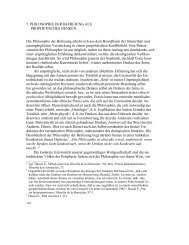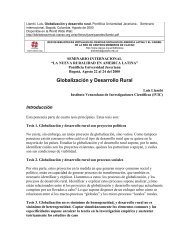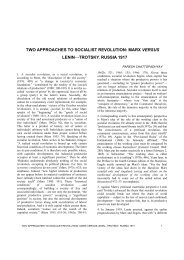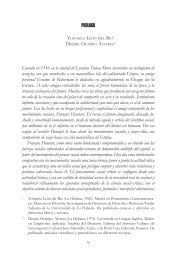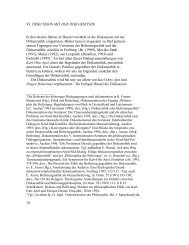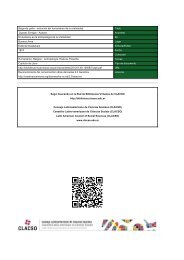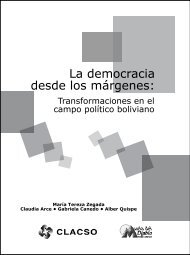1 LOS MACHOS TAMBIEN LLORAN: TELEVISA AND ... - CLACSO
1 LOS MACHOS TAMBIEN LLORAN: TELEVISA AND ... - CLACSO
1 LOS MACHOS TAMBIEN LLORAN: TELEVISA AND ... - CLACSO
You also want an ePaper? Increase the reach of your titles
YUMPU automatically turns print PDFs into web optimized ePapers that Google loves.
transnationalization of economies has radically transformed the<br />
conditions of cultural production. García Canclini thus asks,<br />
¿Qué puede quedar de las identidades nacionales en un<br />
tiempo de globalización e interculturalidad, de<br />
coproducciones multinacionales y Cadenas de las<br />
Américas, de acuerdos de libre comercio e integraciones<br />
regionales, donde los mensajes, los artistas y los<br />
capitales atraviesan constantamente las fronteras?<br />
[...] ¿Pueden ser aún el arte y las comunicaciones<br />
masivas escenarios de la identidad nacional? (28)<br />
His own response would appear to be negative; for the<br />
privatization of communications (which has only intensified in<br />
the four years since the publication of his article) has favored<br />
the domination of U.S.-produced and controlled programming, and<br />
more generally has tended to displace old issues of national<br />
identity in the process of reducing everything to the purely<br />
mercantile (30). As promising exceptions to this rule, he cites<br />
the films La tarea, La mujer de Benjamín, and El bulto (32), yet<br />
one is left wondering what sorts of questions emerge, however<br />
inadvertently, in the transparently commercial forms of<br />
production that García Canclini dismisses. For just as the<br />
commercialization of fiestas and handicrafts that he brilliantly<br />
analyzed in his study Transforming Modernity are not simply<br />
registered as decline or absence but also constitute significant<br />
practical modifications of the lives and welfare of indigenous<br />
communities, so too might the much-abhorred Televisa provide a<br />
window, however opaque and distorted in execution, on changes<br />
taking place in Mexican society today.<br />
Let us return to the issue of machismo, a case in point. As<br />
scholars such as Charles Ramírez Berg, Jean Franco, and Ilene<br />
O'Malley have made clear, machismo is not synonymous with<br />
patriarchy, but rather represents a complex of cultural codes, a<br />
particular construct of masculinity that is intimately linked<br />
with the auto-definition, or historia patria, of the Mexican<br />
state, particularly since the Revolution. O'Malley argues that<br />
the figure of the mythic macho hero became a site in which the<br />
contradictions of the Revolution could be symbolically resolved<br />
and its failures glossed over. Franco points out the consequences<br />
of this symbolic construct for women:<br />
[T]he Revolution with its promise of social<br />
transformation encouraged a Messianic spirit that<br />
transformed mere human beings into supermen and<br />
constituted a discourse that associated virility with<br />
social transformation in a way that marginalized women<br />
at the very moment when they were, supposedly,<br />
liberated. (102)<br />
4




